What’s happening in South Sudan?
South Sudan gained independence from the Republic of the Sudan in 2011. (98.83% support) Its capital and largest city is Juba. But it has suffered ethnic violence and endured a civil war since 2013. Also, 6.9 million people are experiencing hunger. It is about two thirds of the population, 12 million. South Sudan has the third largest refugee (3.7 million) crisis, after Syria and Afghanistan. (if you want to know more stastistics)
There is good news, too. On September 2018, South Sudan’s President Salva Kiir signed a peace deal with main rebel leader Riek Machar formally ending a five-year civil war. Although the conflict has been resolved to some extent, it is still uneasy because it has been violated and moves toward peace.
I would like to introduce young men who move for peace.
1st IPYG Youth Peace Empowerment Project
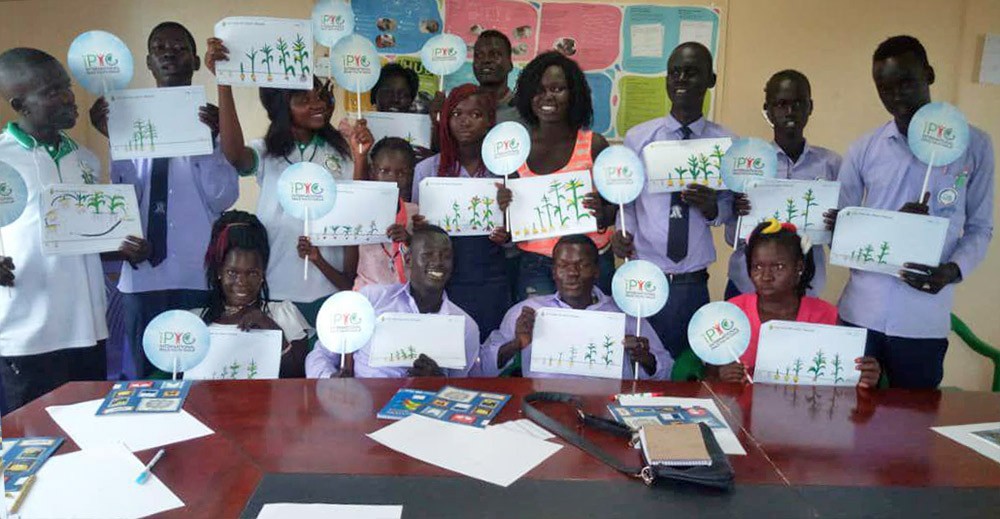
‘The 1st IPYG Youth Peace Empowerment Project’ was held on December 16th at office of Junub Open Space in Juba, South Sudan. It was hosted by International Peace Youth Group(IPYG) and Junub Open Space(JunubOS).
The IPYG Youth Peace Empowerment Project composed of 11 chapters provides an opportunity for students and young people to learn the values such as harmony and co-existence through agriculture where the law of nature is being explored and is closely related to the daily lives of African youths. They would be nurtured as ‘Messenger of peace’ who can lead in the forefront for world peace through various experimental and research activities.
Also IPYG Youth Peace Empowerment Project shares the same vision with the UN SDGs, especially Goal 4 ‘Quality Education’. The project was designed to teach basic agricultural and historical knowledge to students and young people who are excluded from formal educational institutions.
IPYG aims to conduct the project at five schools in South Sudan this year. Furthermore, it is in the process of making educational material to implement the project in all African country.
Reference:
http://www.hwpl.kr/en/news/view/200203461/0/SouthSudanIPYG
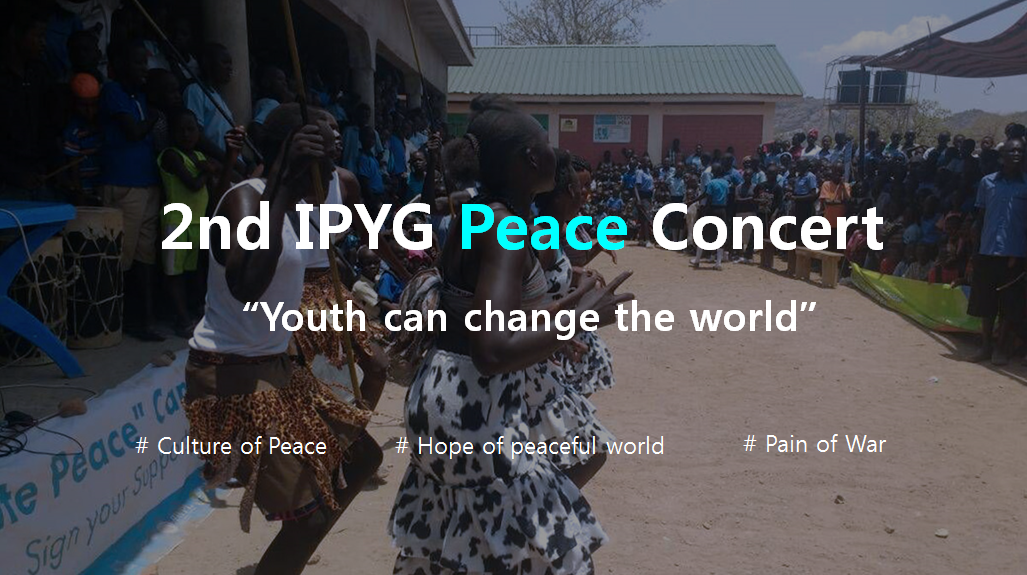
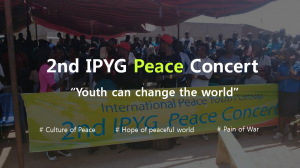 What is the situation of South Sudan? Conflicts and disputes have consistently occurred in South Sudan. It is because of politics and struggles for power. It is very harsh reality. What do the children here think? Can they laugh in the war? Adults should protect our children. So many people are longing for and looking towards a future of peace. Peace Festival! Then, what is the role of the youth in achieving peace under these situations?
What is the situation of South Sudan? Conflicts and disputes have consistently occurred in South Sudan. It is because of politics and struggles for power. It is very harsh reality. What do the children here think? Can they laugh in the war? Adults should protect our children. So many people are longing for and looking towards a future of peace. Peace Festival! Then, what is the role of the youth in achieving peace under these situations?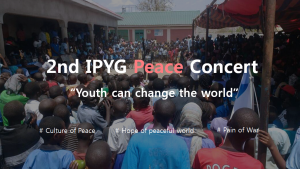 At Peace Concert, numerous colorful performances were able to spread a culture of peace to all citizens in Juba. The event is starting with the traditional dance of South Sudan. The theme is the hope of having a peaceful world and the pain of war. They use ‘Song, Poem and Drama’. In between these programs, prominent figures delivered speeches to convey their heart for peace in the minds of all Juba citizens. Around 3,000 people participated in the concert. It is including government officials, principals, and directors of non-governmental organizations (NGOs).
At Peace Concert, numerous colorful performances were able to spread a culture of peace to all citizens in Juba. The event is starting with the traditional dance of South Sudan. The theme is the hope of having a peaceful world and the pain of war. They use ‘Song, Poem and Drama’. In between these programs, prominent figures delivered speeches to convey their heart for peace in the minds of all Juba citizens. Around 3,000 people participated in the concert. It is including government officials, principals, and directors of non-governmental organizations (NGOs).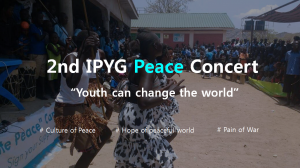 One participant said, “I’m experienced a truly peaceful world without war.” He hope for the day when this event becomes the best peace festival not only in Juba but in all of South Sudan.
One participant said, “I’m experienced a truly peaceful world without war.” He hope for the day when this event becomes the best peace festival not only in Juba but in all of South Sudan.![A STEP TOWARDS PEACE WeAreOne TogetherForPeace Sunge Emmanuel South Sudan Salt March Romania Radu Alexandru Peace walk OSUT Mumbai Martin Luther King Jr. March on Washington Mahatma Gandhi Kolkata Kapuki Senior Secondary School Juba Jimmi Hendrix IWPG IPYG India. I have a dream Hyderabad HWPL HighFive Gun Violence ew Delhi Europe’s first Peace Walk Route DPCW Cluj-Napoca Civil Rights Act ANewStart 5th Annual Commemoration of the Declaration of World Peace A STEP TOWARDS PEACE [D-4] Peace Walk All Over the World #3 WeAreOne TogetherForPeace Sunge Emmanuel South Sudan Salt March Romania Radu Alexandru Peace walk OSUT Mumbai Martin Luther King Jr. March on Washington Mahatma Gandhi Kolkata Kapuki Senior Secondary School Juba Jimmi Hendrix IWPG IPYG India. I have a dream Hyderabad HWPL HighFive Gun Violence ew Delhi Europe’s first Peace Walk Route DPCW Cluj-Napoca Civil Rights Act ANewStart 5th Annual Commemoration of the Declaration of World Peace](http://www.peacestep.com/wp-content/uploads/2018/05/Peace-walk-300x199.png) In wikipedia, a
In wikipedia, a![A STEP TOWARDS PEACE WeAreOne TogetherForPeace Sunge Emmanuel South Sudan Salt March Romania Radu Alexandru Peace walk OSUT Mumbai Martin Luther King Jr. March on Washington Mahatma Gandhi Kolkata Kapuki Senior Secondary School Juba Jimmi Hendrix IWPG IPYG India. I have a dream Hyderabad HWPL HighFive Gun Violence ew Delhi Europe’s first Peace Walk Route DPCW Cluj-Napoca Civil Rights Act ANewStart 5th Annual Commemoration of the Declaration of World Peace A STEP TOWARDS PEACE [D-4] Peace Walk All Over the World #3 WeAreOne TogetherForPeace Sunge Emmanuel South Sudan Salt March Romania Radu Alexandru Peace walk OSUT Mumbai Martin Luther King Jr. March on Washington Mahatma Gandhi Kolkata Kapuki Senior Secondary School Juba Jimmi Hendrix IWPG IPYG India. I have a dream Hyderabad HWPL HighFive Gun Violence ew Delhi Europe’s first Peace Walk Route DPCW Cluj-Napoca Civil Rights Act ANewStart 5th Annual Commemoration of the Declaration of World Peace](http://www.peacestep.com/wp-content/uploads/2018/05/peacewalk2-300x229.png) Thousands set out to town Dandi on the Arabian Sea in order to resist British Salt policies. More than 80,000 people were arrested and beaten but they prompted international outcry against British policy and captured the world’s attention.
Thousands set out to town Dandi on the Arabian Sea in order to resist British Salt policies. More than 80,000 people were arrested and beaten but they prompted international outcry against British policy and captured the world’s attention.![A STEP TOWARDS PEACE WeAreOne TogetherForPeace Sunge Emmanuel South Sudan Salt March Romania Radu Alexandru Peace walk OSUT Mumbai Martin Luther King Jr. March on Washington Mahatma Gandhi Kolkata Kapuki Senior Secondary School Juba Jimmi Hendrix IWPG IPYG India. I have a dream Hyderabad HWPL HighFive Gun Violence ew Delhi Europe’s first Peace Walk Route DPCW Cluj-Napoca Civil Rights Act ANewStart 5th Annual Commemoration of the Declaration of World Peace A STEP TOWARDS PEACE [D-4] Peace Walk All Over the World #3 WeAreOne TogetherForPeace Sunge Emmanuel South Sudan Salt March Romania Radu Alexandru Peace walk OSUT Mumbai Martin Luther King Jr. March on Washington Mahatma Gandhi Kolkata Kapuki Senior Secondary School Juba Jimmi Hendrix IWPG IPYG India. I have a dream Hyderabad HWPL HighFive Gun Violence ew Delhi Europe’s first Peace Walk Route DPCW Cluj-Napoca Civil Rights Act ANewStart 5th Annual Commemoration of the Declaration of World Peace](http://www.peacestep.com/wp-content/uploads/2018/05/peacewalk3-300x226.png) Millions gathered to draw attention to inequalities faced by African Americans after emancipation. This walk helped to create national understanding of racial injustice,
Millions gathered to draw attention to inequalities faced by African Americans after emancipation. This walk helped to create national understanding of racial injustice,![A STEP TOWARDS PEACE WeAreOne TogetherForPeace Sunge Emmanuel South Sudan Salt March Romania Radu Alexandru Peace walk OSUT Mumbai Martin Luther King Jr. March on Washington Mahatma Gandhi Kolkata Kapuki Senior Secondary School Juba Jimmi Hendrix IWPG IPYG India. I have a dream Hyderabad HWPL HighFive Gun Violence ew Delhi Europe’s first Peace Walk Route DPCW Cluj-Napoca Civil Rights Act ANewStart 5th Annual Commemoration of the Declaration of World Peace A STEP TOWARDS PEACE [D-4] Peace Walk All Over the World #3 WeAreOne TogetherForPeace Sunge Emmanuel South Sudan Salt March Romania Radu Alexandru Peace walk OSUT Mumbai Martin Luther King Jr. March on Washington Mahatma Gandhi Kolkata Kapuki Senior Secondary School Juba Jimmi Hendrix IWPG IPYG India. I have a dream Hyderabad HWPL HighFive Gun Violence ew Delhi Europe’s first Peace Walk Route DPCW Cluj-Napoca Civil Rights Act ANewStart 5th Annual Commemoration of the Declaration of World Peace](http://www.peacestep.com/wp-content/uploads/2018/05/peacewalk4-213x300.png) Started on 28 July in Vienna, Austria and ending 23 days later in Trieste, Italy, the
Started on 28 July in Vienna, Austria and ending 23 days later in Trieste, Italy, the ![A STEP TOWARDS PEACE WeAreOne TogetherForPeace Sunge Emmanuel South Sudan Salt March Romania Radu Alexandru Peace walk OSUT Mumbai Martin Luther King Jr. March on Washington Mahatma Gandhi Kolkata Kapuki Senior Secondary School Juba Jimmi Hendrix IWPG IPYG India. I have a dream Hyderabad HWPL HighFive Gun Violence ew Delhi Europe’s first Peace Walk Route DPCW Cluj-Napoca Civil Rights Act ANewStart 5th Annual Commemoration of the Declaration of World Peace A STEP TOWARDS PEACE [D-4] Peace Walk All Over the World #3 WeAreOne TogetherForPeace Sunge Emmanuel South Sudan Salt March Romania Radu Alexandru Peace walk OSUT Mumbai Martin Luther King Jr. March on Washington Mahatma Gandhi Kolkata Kapuki Senior Secondary School Juba Jimmi Hendrix IWPG IPYG India. I have a dream Hyderabad HWPL HighFive Gun Violence ew Delhi Europe’s first Peace Walk Route DPCW Cluj-Napoca Civil Rights Act ANewStart 5th Annual Commemoration of the Declaration of World Peace](http://www.peacestep.com/wp-content/uploads/2018/05/afor_banner_focused_pic_1-300x225.jpg) Women do not remain silent in talking and walking to prevent violent extremism. So peace walks and educational activities were held in New Delhi, Kolkata, Mumbai, and Hyderabad, India.
Women do not remain silent in talking and walking to prevent violent extremism. So peace walks and educational activities were held in New Delhi, Kolkata, Mumbai, and Hyderabad, India.![A STEP TOWARDS PEACE WeAreOne TogetherForPeace Sunge Emmanuel South Sudan Salt March Romania Radu Alexandru Peace walk OSUT Mumbai Martin Luther King Jr. March on Washington Mahatma Gandhi Kolkata Kapuki Senior Secondary School Juba Jimmi Hendrix IWPG IPYG India. I have a dream Hyderabad HWPL HighFive Gun Violence ew Delhi Europe’s first Peace Walk Route DPCW Cluj-Napoca Civil Rights Act ANewStart 5th Annual Commemoration of the Declaration of World Peace A STEP TOWARDS PEACE [D-4] Peace Walk All Over the World #3 WeAreOne TogetherForPeace Sunge Emmanuel South Sudan Salt March Romania Radu Alexandru Peace walk OSUT Mumbai Martin Luther King Jr. March on Washington Mahatma Gandhi Kolkata Kapuki Senior Secondary School Juba Jimmi Hendrix IWPG IPYG India. I have a dream Hyderabad HWPL HighFive Gun Violence ew Delhi Europe’s first Peace Walk Route DPCW Cluj-Napoca Civil Rights Act ANewStart 5th Annual Commemoration of the Declaration of World Peace](http://www.peacestep.com/wp-content/uploads/2018/05/aa11-300x225.jpg) Kapuki Senior Secondary School located in Juba, the capital city of South Sudan, hosted Peace Walk, in which 5,000 people participated.
Kapuki Senior Secondary School located in Juba, the capital city of South Sudan, hosted Peace Walk, in which 5,000 people participated.![A STEP TOWARDS PEACE WeAreOne TogetherForPeace Sunge Emmanuel South Sudan Salt March Romania Radu Alexandru Peace walk OSUT Mumbai Martin Luther King Jr. March on Washington Mahatma Gandhi Kolkata Kapuki Senior Secondary School Juba Jimmi Hendrix IWPG IPYG India. I have a dream Hyderabad HWPL HighFive Gun Violence ew Delhi Europe’s first Peace Walk Route DPCW Cluj-Napoca Civil Rights Act ANewStart 5th Annual Commemoration of the Declaration of World Peace A STEP TOWARDS PEACE [D-4] Peace Walk All Over the World #3 WeAreOne TogetherForPeace Sunge Emmanuel South Sudan Salt March Romania Radu Alexandru Peace walk OSUT Mumbai Martin Luther King Jr. March on Washington Mahatma Gandhi Kolkata Kapuki Senior Secondary School Juba Jimmi Hendrix IWPG IPYG India. I have a dream Hyderabad HWPL HighFive Gun Violence ew Delhi Europe’s first Peace Walk Route DPCW Cluj-Napoca Civil Rights Act ANewStart 5th Annual Commemoration of the Declaration of World Peace](http://www.peacestep.com/wp-content/uploads/2018/05/47-300x168.jpg) Romanian citizens gathered to participate in the event in Cluj-Napoca, the second most populous city. Radu Alexandru, President of OSUT, said “I am proud to be a Romanian as from its origin this people had a vision for peace. This may not be written on a stone or anywhere, but if you look in our history you will see it. In our genes peace is written”
Romanian citizens gathered to participate in the event in Cluj-Napoca, the second most populous city. Radu Alexandru, President of OSUT, said “I am proud to be a Romanian as from its origin this people had a vision for peace. This may not be written on a stone or anywhere, but if you look in our history you will see it. In our genes peace is written”![A STEP TOWARDS PEACE WeAreOne TogetherForPeace Sunge Emmanuel South Sudan Salt March Romania Radu Alexandru Peace walk OSUT Mumbai Martin Luther King Jr. March on Washington Mahatma Gandhi Kolkata Kapuki Senior Secondary School Juba Jimmi Hendrix IWPG IPYG India. I have a dream Hyderabad HWPL HighFive Gun Violence ew Delhi Europe’s first Peace Walk Route DPCW Cluj-Napoca Civil Rights Act ANewStart 5th Annual Commemoration of the Declaration of World Peace A STEP TOWARDS PEACE [D-4] Peace Walk All Over the World #3 WeAreOne TogetherForPeace Sunge Emmanuel South Sudan Salt March Romania Radu Alexandru Peace walk OSUT Mumbai Martin Luther King Jr. March on Washington Mahatma Gandhi Kolkata Kapuki Senior Secondary School Juba Jimmi Hendrix IWPG IPYG India. I have a dream Hyderabad HWPL HighFive Gun Violence ew Delhi Europe’s first Peace Walk Route DPCW Cluj-Napoca Civil Rights Act ANewStart 5th Annual Commemoration of the Declaration of World Peace](http://www.peacestep.com/wp-content/uploads/2018/05/2018_525_en-10-300x200.jpg) If not me, who? If not now, when?
If not me, who? If not now, when?